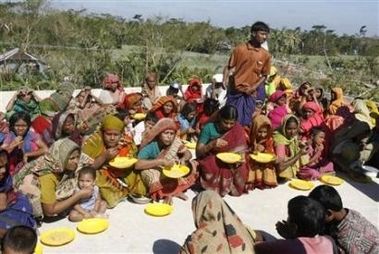Relief begins to reach cyclone victims
Updated: 2007-11-20 11:27
PADMA, Bangladesh -- Urgently-needed supplies of food, water and medicine were Tuesday nearing people in remote areas of Bangladesh where a devastating cyclone has left millions homeless and thousands dead.
|
|
With roads now cleared of hundreds of trees that had blocked aid convoys, officials said relief was finally starting to get through to the most inaccessible areas four days after the colossal storm hit.
But they warned that longer term assistance for the millions of survivors -- many of whom have lost everything and have no food or clean water -- would be vital.
Bangladeshis are famed for their resilience in the face of the frequent floods and storms that hit the impoverished and low-lying country.
But World Food Programme country representative Douglas Casson Coutts said the extent of the devastation would make it difficult for people to rebuild their lives.
"There is significant damage to the infrastructure. There will definitely have to be longer term assistance to get people on their feet again," he said.
Villagers in some of the country's most remote areas, where virtually every home was washed away, said they were now worried about how they would re-establish their livelihoods.
In the southern fishing town of Padma, the wooden trawlers that the population relies on to make a living were smashed to bits by the storm.
"In about 30 minutes we all became paupers," said Abdul Jalil, a fisherman, who lost his mother, son, a nephew and two fishing trawlers in one of worst cyclones in the country's history.
Distraught villagers in the area said they had not yet received any assistance, but help was on its way with officials asserting the aid effort had now accelerated as earlier transport and communication problems eased.
"The access is getting better every day," said Coutts. "We have had to use boats to deliver food but it was possible to do it."
He said he expected everyone in need would be reached within a few days.
Officials said the armed forces were continuing to work side-by-side with aid agencies to deliver relief by air, road and sea to remote places.
The confirmed death toll stood at over 3,100 but officials feared it could run into many thousands after all the victims in isolated areas were accounted for.
The head of the Bangladeshi Red Crescent, a part of the global Red Cross federation, said he believed between 5,000 and 10,000 people had died.
"The scale of this disaster is enormous," says Heather Blackwell, the Bangladesh head of the British aid group Oxfam.
"People here are resilient. However, the scale is such that it will take months for people to be able to return to their normal lives."
She also said it "could take weeks before we know exactly how bad this cyclone was."
Meanwhile, offers of international aid continued to pour in.
Oil-rich Saudi Arabia has pledged 100 million dollars in aid, and US ships were powering to the disaster zone with dozens of helicopters to help coordinate relief efforts.
The Jeddah-based Organisation of the Islamic Conference has called on governments and civil bodies in its 57 member states to send urgent assistance to the impoverished Muslim country.
The British government confirmed aid worth 2.5 million pounds (3.5 million euros, 5.1 million dollars), to be channelled through the United Nations and used to provide food, water, housing repairs and medical treatment.
In Brussels, the European Commission pledged a further five million euros (7.3 million dollars) on top of an initial 1.5 million euros released Friday.
"The immediate and critical needs are for food, clean drinking water, shelter materials, clothes, blankets and cooking utensils," said EU Humanitarian Aid Commissioner Louis Michel.
"The enormous damage to infrastructure, coupled with losses of both crops and livestock, mean that urgent action is also needed on basic rehabilitation. Otherwise, disease and malnutrition could claim many more victims."
|
|
|
||
|
||
|
|
|
|
